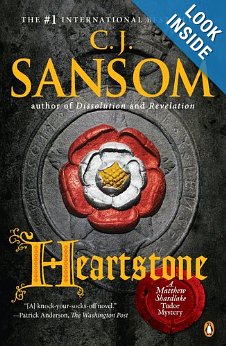There are now five novels in the Matthew Shardlake series of medieval mysteries written by C.J. Sansom, this being the fifth one. It weighs in at over 600 pages of detailed, carefully argued plot set during the reign of Henry VIII, more specifically this one is set in 1545 when the French came calling at Portsmouth in retaliation for the failed English invasion of France (failed, except for the destruction of the city of Bologne). Here is the published summary of this novel on Amazon…
“In 1545, as a French fleet threatens invasion, the English queen, Catherine Parr, asks Shardlake to look into a matter for an old servant, whose son committed suicide shortly after filing a protest about the wardship of a boy the son had tutored. Soon after accepting this assignment, Shardlake is assaulted by a gang of thugs, who warn him to drop the matter. On his own, he also probes the past of a Bedlam inmate, Ellen Fettiplace, who was institutionalized 20 years earlier after being raped. Both cases turn out to be extremely complex, and Shardlake, who puts justice above his personal interests, ends up with several murders to solve as well. Strong prose makes Tudor England instantly accessible, and the clockwork plotting sustains deep interest throughout.”
Perhaps a word at this juncture about the author would be in order. Like Ian Rankin, C.J. Sansom is from Edinburgh, born in 1952 and educated at Birmingham where he took a PhD in history (and in these novels it certainly shows— there is a lot of interesting historical and social detail from the period about which he is writing). Having worked at various jobs, and apparently being unsatisfied, he retained as a lawyer, much like his character Shardlake, and practiced in Sussex (where much of this novel is set) as an advocate for the poor (much like Shardlake in this and other novels). Sansom lives in Sussex stil where is no longer practices law, but rather is a full time novelist. Clearly, we have a case of art imitating some of the life of the novelist in this series. That hardly matters if Sansom weren’t a very able novelist— but he is.
Reviewers in the past have quite rightly compared Sansom’s novels with those of Paul Doherty (especially the Hugh Corbett series, which is however set during a different, much earlier period of English history during the reign of Edward I). Doherty, whom I had the pleasure of meeting and having a good meal with during my last stay in the U.K. earlier this year, is likewise a historian, and someone who runs a school while at the same time writing a multitude of novels. He is much more prolific than Sansom, running several series of novels both medieval and from more ancient periods, at once, and his novels tend to be shorter and more vivid than those of Sansom’s.
Heartstone is an intriguing read, which keeps you guessing until near the very end of the some 630 pages of the novel. The relationship between Shardlake and his right hand man Jack Barak has become strained due to the fact that Barak’s wife is expecting a child, and yet Shardlake needs Barak to go with him on his various investigations on behalf of Queen Catherine and others. Shardlake is an older man, unmarried, and his trials and tribulations as a hunchback, and so a subject of ridicule and suspicion, are well chronicled in this series of novels.
This particular novel exposes the dirty underbelly of medieval politics and even of country life as the rich seek to get richer and defraud the poor of their land and livelihoods. Shardlake stands as a figure who is a relentless bloodhound sniffing out the truth and pursuing justice, often at the cost of his health, and sometimes almost at the cost of his life.
Sansom writes well, he is especially good at historical description (not surprisingly), and he does a good job of mixing fact with surmise or pure fiction. If you love English history, and love a good mystery, especially where there is a character who is likeable and fights for justice, you would enjoy this novel. Oh yes, it also deals with the Christianity of the period. Here is a small sample of the dialogue:
Shardlake has just been told he ought to turn to prayer in times of difficulty and danger when much evil is happening all around. He responds..
“How can God allow such things to happen? How? I think of that ship going down, of the savagery Reformers and Catholics show each to each other,…sometimes I think God only laughs at us.”
The minister with whom he is dialoguing responds: “I understand how people can think like that nowadays. And if God were all powerful, perhaps you would be right. But the Gospels tell a different story. The cross you see. For myself I think Christ suffers with us.”
Shardlake responds: “What is the good of that… How does that help?”
(p. 601).
In short, there are probing theological questions raised by this series of novels, as well as historical ones, and I commend them to you. My favorite in the series thus far is the one entitled Dark Fire.













